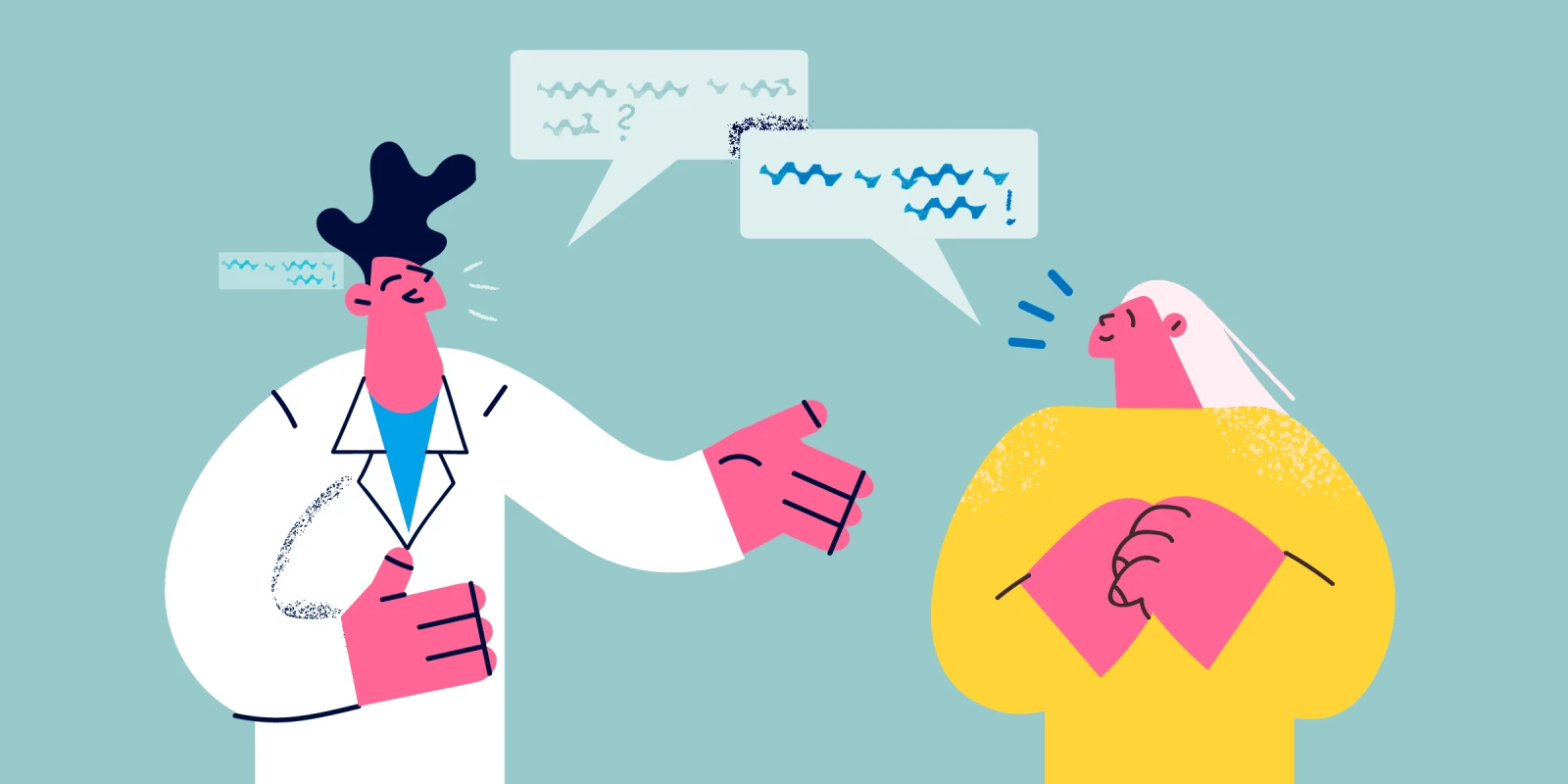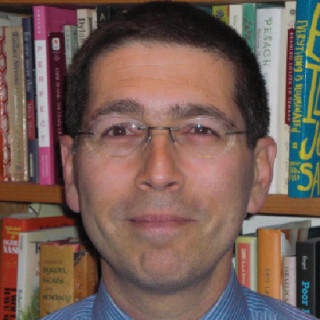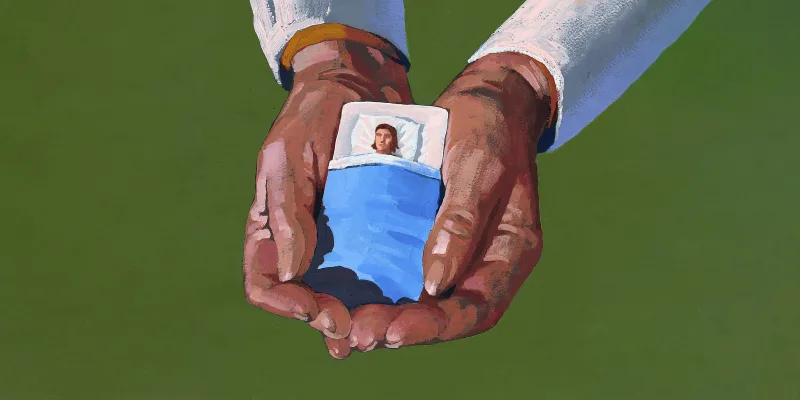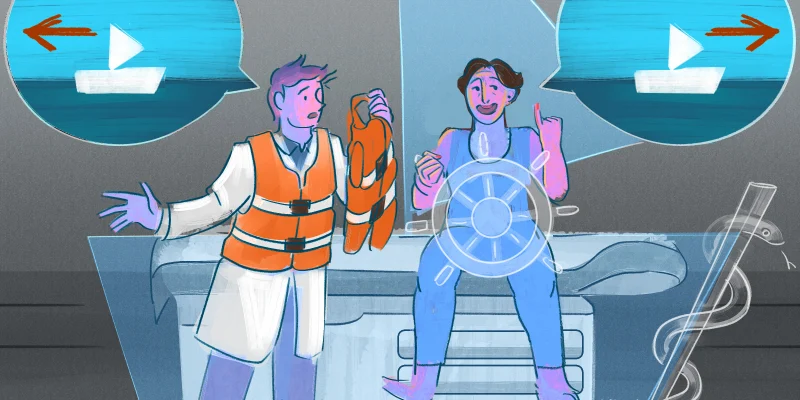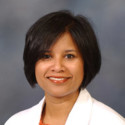There are certain “throwaway lines” (mostly from patients, families, staff, or colleagues) that travel in one ear and out the other but luckily miss the exit and park themselves in the memory lot of your career. They capture a chance meeting, an incidental discussion, or a poignant interchange that emerges when you least expect it. Often, we hear them only with an attuned “third ear.”
I have kept a mini journal with some of these “lines” as far back as medical school and a brief description of why they each held purchase. So, without further ado, here are some of my most evocative throwaways.
1) “We never would have met.” In the anecdote below, I learned that the patient in front of me had her own narrative that was being composed before my eyes, and that that narrative was different from my own. My lost night on call was her opportunity to make a new friend.
In 1984, after returning from a year off on an educational experience abroad, I entered my last year of med school out of sync with my former classmates. To gain support for my residency applications, I had to re-engage the attendings and mentors from my internal medicine and geriatrics rotations in my prior third year or risk being forgotten. The year away was a bit of a gamble, but it was a “growth journey” and cemented my decision to be an internist and geriatrician. Back then however, I needed new friends, some educational shoring up, and renewed self-confidence. I began my ‘sub-internship’ during a scorching August at our medical school’s flagship hospital. During on-call nights, of course I was expected to cover for my team’s other patients.
One night at about 3 a.m., I was called for a potassium just north of 6.0 in an older woman who had no clear reason to be hyperkalemic. While reviewing some treatment options, I decided to quietly enter her room so as not to wake up her roommate and draw a stat sample to confirm the high potassium. She looked to be in her 80s or 90s and wore thick coke-bottle glasses which were standard after cataract surgery back then and pre-dated the intraocular lenses of today. After I softly tapped her arm, she squinted at me with her googly looking eyes. I apologized for waking her up and inflicting “a little pinch” of a needle. She looked at me through her distorted but converging eyes and said, “Kismet! If you hadn’t been here at this moment, we never would have met!”
2) “You could at least try.” In the anecdote below, I learned that what seems intuitive to me in advanced care planning discussions is anything but to the patient in front of me. What may seem like a poor “quality of life” to me might be a life of richness and meaning to my patient.
I was now well into my intern year. There are “legendary” patients that are “passed down” like heirlooms from one generation of house officers to the next. Such was Lydia. Lydia suffered from the autosomal dominant malady called Peutz-Jeghers Syndrome (PJS). I’m sure she was the first and last person with PJS that I have seen. The reason Lydia was so legendary is that she had just passed 90 and in my intern year alone, she must have been admitted over 25 times for severe anemia that required transfusion.
One night Lydia came in with hemoglobin of 4 and high-output congestive heart failure, iron overload, cirrhosis, and mild encephalopathy. Her body seemed to be giving out. My senior resident knew of my burgeoning interest in geriatrics and asked me to talk to Lydia about end-of-life wishes and goals of care, and to obtain a possible DNR. I had read up on the proper approach for this and how to make a patient and family feel most at ease: comfortable chairs, soft lighting, plenty of time and plenty of tissues. Lydia never seemed to be stationary enough to achieve this standard and was always being swept to a test or in the middle of a transfusion.
I began the discussion in her shared room, a less than ideal setting. I went into a youthful rendition of my now effortless and mature spiel. Finally, exhausted from an all-night stay at Lydia’s side as we rescued her from yet another crisis, I capped off my remarks with the inartful phrase, “Well if this should happen again, would you want us to do all we can to keep you alive even though that may cause you suffering and pain?” Taking great umbrage, sitting bolt upright, and wrinkling her face, Lydia said, “Well, you could at least try!”
3) “The doctor’s job is to hold the IV bottle.” In the anecdote below, I assumed in a cross-cultural experience that my self-preservation and survival were paramount, whereas to the Japanese nurse it was the patients who came first. The tenets of Japanese collectivism trumped my Western notion of individualism, even during an earthquake.
I mentioned above that I had taken time off between third and fourth year (1983-84) in medical school to go abroad for an educational opportunity. I was the recipient of a Henry Luce Fellowship. Luce’s parents had been missionaries in China during the first half of the 20th century. The mission of Henry Luce, as I understood it, was to select individuals post-college with a declared profession (but without any prior experience in Asia) to live and work in an Asian country for a year. The goal was that these Luce Fellows would come back to our home country and cross-pollinate their profession with Asian ideas and ideals. I was placed at Tokyo Metropolitan Geriatric Hospital, otherwise known as Yoikuin. I learned a lot about geriatric medicine but also about cross-cultural differences in the approach to patients and some of the ethics of treating and speaking with patients.
I’d been at Yoikuin for two or three weeks when I heard a crescendo of jangling noises: the hangers inside our lockers were swaying back and forth against the lockers’ metal doors. Within seconds, the floor gave the impression of a wave of concrete and everything on it appeared to be swimming. I quickly understood this to be the first tremor of many that I would live through over the year (well before the devastating Kobe earthquake of 1995 and Tohoku tsunami of 2010). I found my legs and whizzed to the ward down the hall to ask the nurses in broken Japanese what to do. A nurse that seemed to be in charge took me by the hand, led me to a bedside, and said in English, “The doctor’s job is to hold the IV bottle.”
While these lines may seem like ‘throwaways,” and had I not written them down as brief notes in a file, may have passed as just that, there was something in each setting that triggered in me the need to memorialize and keep these comments and scenes close at hand. It is easy to get lost in the minutiae and mistakes of practice, and the notes, as well as greeting cards from those I have served, act both as a tonic and talisman to keep my head and my heart in the game. So it turns out that these three lines recalled and enumerated above were anything but throwaways. They each, at times when I have needed them the most, sounded chords that rescued me from the cacophony of practice and delivered me to the melodies of medical practice that are often just out of hearing range. When I reflect on all the lines exchanged in medicine — a missed diagnosis, a family conversation that went awry, a comment to a patient you wish you could take back — it is the ones above that bring me solace and delight. They are keepsakes that I will never throw away.
Names have been changed to protect patient privacy.
What lines from patients or colleagues have been most meaningful to you over the course of your career? Share them in the comments below!
Dr. Schor is a geriatrician specializing in long-term and post-acute care. He was medical director and attending physician at Daughters of Israel for close to 30 years and is now a Senior Medical Director at Optum Health. He is a new grandfather, an avid birder, and lives in Millburn, NJ. Dr. Schor is a 2022–2023 Doximity Op-Med Fellow.
Image by Alphavector / Shutterstock
